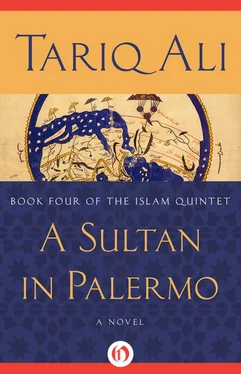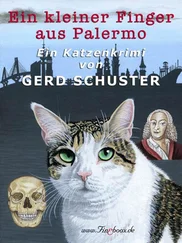Mayya nodded and whispered in return.
‘Thank Allah your hair, too, is dark. One day I will tell her everything.’
She stroked his hair and signalled that they should sit at the table. He followed her but could not restrain himself from touching her neck. She trembled slightly as they sat down to the tempting quails, serving him and then helping herself. She signalled that he should eat and said in a loud voice, ‘When Abd al-Rahman goes to paradise, I’m sure the angel Jibril will appoint him to take charge of the heavenly kitchens. How was the food on your boat? As always?’
‘It was unmentionable. Worse than usual. Let us not waste time on that. These quails are heavenly.’
And they managed to talk about the care that must have gone into each dish and the freshness of the vegetables for another half hour. Then Idrisi began to speak of his travels. And all this time while talking of food and maps and the sea, they were busy exploring each other’s terrain. The incongruity of the words and actions was so pronounced that more than once he had to put his hand on her mouth to stop her laughing. While feeling her breasts beneath three layers of cloth he commented on the deliciousness of the melons upon which she laughed aloud. The noise frightened them and they rushed back to the table to sit at opposite ends. Then, from a safe distance their eyes continued to feast on each other. The risk of making physical contact became clear when, without warning, the doors burst open and the Sultan walked in with Elinore holding his arm. Idrisi rose to his feet in genuine surprise. Mayya smiled calmly, but underneath her multi-layered dress she could hear her own noisy heart which, faced with the quandary of pleasure or guilt, always chose the former. Idrisi, too, maintained his composure.
‘Allah be praised. You are well again, Exalted One.’
Rujari did not waste time on formalities. ‘Your laughter could be heard in every corner of the palace, Mayya. Won’t you share the joke with us?’
She did not hesitate. ‘It was the way Master Idrisi referred to the melons, my lord. He held them in each hand and spoke loudly, knowing full well that someone outside was listening and would report his comments to the kitchen. It was the look on his face more than the words.’
To back her up, Idrisi picked up the melons and took the pose of a Greek god.
Rujari smiled, while Elinore began to laugh, just like her mother. Strange, her father thought, how both of them have this brightly coloured laughter. Primitive, but pure. A real joy to the ear.
Idrisi began to study his daughter’s features more closely. Her eyebrows reminded him of his mother. How she would have treasured this child. The Sultan was watching him intently.
‘She is beautiful, is she not, Master Idrisi?’
Elinore’s face flushed and she went to sit next to her mother.
‘She bears a certain resemblance to your mother, or am I mistaken?’
‘You are not mistaken. But I sometimes wonder whether the resemblance is in her features or her character. I can’t decide. Either would make me happy. You may go, child.’
As she rose to leave, Idrisi addressed her directly. ‘Are you happy with your tutor?’
‘Yes, I am, master,’ she replied with a confidence that pleased him enormously.
‘He says my Arabic and Latin are now perfect and wants to teach me Greek.’
Idrisi surprised himself. ‘If your father agrees, I will give you some lessons in geography. We think Palermo is the centre of the world and in some ways it is, but it is not the real centre.’
To the surprise of the girl and her parents, the Sultan was not inclined to agree. ‘There are many other things a young woman needs to learn before we burden her with geography.’
Elinore was displeased. ‘Name one other thing, father.’
The strength of innocence was remarkable and both men smiled in admiration.
‘We shall continue this discussion on another occasion, my child, and perhaps I will relent on this question. After all, I helped Master Idrisi prepare the research for his book. That’s why he has titled it ‘al-kitab al-Rujari’. But now I must take him away from you. I need to consult him on a matter of great importance to the kingdom which may involve its future geography.’
Idrisi bowed to Mayya and smiled at Elinore. As the two men walked slowly to the private audience chamber, Idrisi commented on the speed of the Sultan’s recovery and asked if these attacks were frequent. The Sultan nodded, but made it clear he knew that his time on this earth was limited and it was on another matter in preparation for the future that he needed advice. This was the third time that day that Rujari had indicated that something was worrying him. Idrisi wondered why he could not speak of it. They had been seated for some time and still the Sultan remained silent, his eyes refusing to make contact with those of his friend.
‘Commander of the Powerful, for over twenty years now I have known you well. This is the first occasion I can recall that you have had some difficulty in entrusting me with something that is clearly worrying you.’
The Sultan looked at him. ‘Something you said earlier continues to echo in my mind. You said I was Sultan Rujari in Palermo but King Roger on the mainland. Well, my friend, I have to become King Roger in Palermo as well. The Bishops have warned me that the Barons from Apulia and Messina and others who were not named have decided to act after my death. They aim to kill poor William and put one of themselves on the throne. The Bishops advise that in order to retain control of the future I must make my loyalty to the Church visible to all.’
Idrisi realised the gravity of the situation. ‘A blood sacrifice?’
‘I fear so.’
‘If it’s me you want, I would prefer the scimitar to the fire.’
‘It is not a matter for frivolity. They want the head of Philip al-Mahdia.’
Shaken by the news, Idrisi rose to his feet, his face filled with anger. Philip was the most respected of the Sultan’s counsellors in Siqilliya. He was a eunuch who had fled from slavery in Ifriqiya as a young man and found sanctuary in Palermo. Born a Muslim, after his father’s death he had been sold into slavery to a Greek merchant. He was baptised and destined for the Church in Constantinople. But the merchant ship transporting him was raided by pirates and he was eventually sold to a merchant household in al-Mahdia. He converted voluntarily to Islam and soon escaped servitude by stowing aboard a vessel destined for Palermo. Equally fluent in Arabic, Greek and Latin, his facility with languages recommended him to the royal Diwan. His gifts were not confined to translation. Such were his capabilities as an administrator, he became the master of the household and, later, an effective Amir al-bahr , a sea-commander feared by the enemies of Siqilliya. He was often at the side of George of Antioch, the sea-commander who conquered the Ifriqiyan coastal city-states for the Siqilliyan king. After George’s death, Philip was appointed as his successor. Within the palace, he came to occupy a position second only to the Sultan. A Grand Vizier, but without a grandiose title. And in Rujari’s absence, Philip’s authority was unquestioned. In the city itself he was seen as the generous protector of Jews and Believers.
Only a few weeks before his return to Palermo, when Idrisi’s ship had docked in a small port in Calabria to replenish their supplies of drinking water, they had been told in glowing terms of Philip’s triumph in Bone on the Ifriqiyan coast.
The Bishops undoubtedly found him a serious obstacle to their plans, most notably the slow forced conversion of all infidels. That could be the only reason for them to demand his removal. Philip also possessed a sharp tongue and made little effort to disguise his aversion to some of the priests, while maintaining a close friendship with others. Idrisi could understand why the clerics wanted blood. But what had happened to Rujari?
Читать дальше












